Courses Paid courses Attachment and Trauma
Attachment and Trauma
| Achieve a certificate |
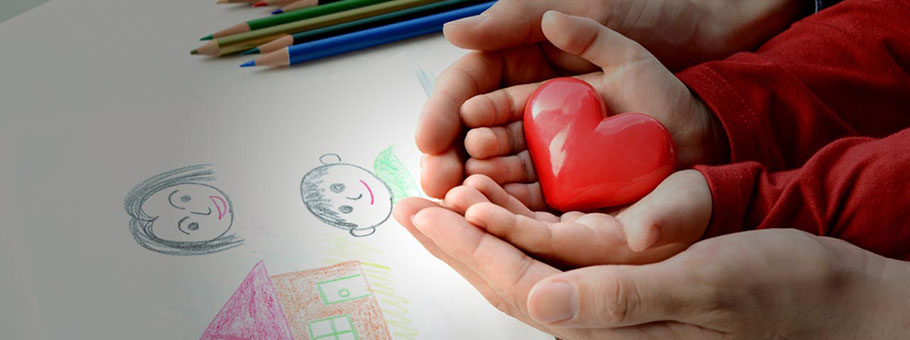
Attachment theory explains the importance of a child’s emotional bond with their primary caregivers. If this bond is disrupted or lost it can adversely affect a child’s emotional and psychological wellbeing and may lead to trauma. Left unaided, attachment and trauma difficulties, such as bereavement, abuse, neglect or war, can have a lasting impact on a child’s social and cognitive development.
A learner with attachment and trauma difficulties may have problems forming strong attachments and relationships. They may display a consistent pattern of withdrawn behaviours or have episodes of unexplained irritability sadness or fearfulness. They may also be prone to lashing out or running away. Helping a learner to ‘engage and achieve’ in the curriculum and lead emotionally resilient lives requires access to educational experiences that foster confidence in abilities, teach self-regulation skills and model how to build secure and nonthreatening relationships.
The course content draws on the attachment-informed practice of Yarra Me School (a specialist school in Melbourne, Australia, delivering therapeutic education programmes) and the model of attachment training and research carried out by Bath Spa University. The content relates to learners in compulsory education (4-18 years), however, the theory and many of the assessment and intervention strategies can be contextualised and implemented in early years settings too.
This course aims to develop the knowledge, skills and practice of all education professionals working with children and young people (CYP) with attachment and trauma difficulties. You will learn how to assess the needs of the learner and go on to develop a support plan consisting of SMART goals and interventions, which you will implement and later review to determine how well it has met the learner’s specific developmental needs.
Course learning outcomes
On successful completion of the course, you will be able to:
- explain the importance of inclusive practices in ensuring good life outcomes
- discuss the origins of attachment theory and evaluate its strengths and weaknesses
- describe the four attachment styles
- use simple assessment tools and teacher checklists to Identify attachment difficulties
- describe strategies for working with each type of attachment style
- discuss the power of relationships and apply the process of personalising learning
- respond effectively to challenging incidents including self-care
- offer personalised support within a Response to Intervention Framework
- create a support plan for a pupil/group of pupils in your school
Our courses are structured into four sections. Click on the section headings to reveal page titles and some example content.
Develop an overview of attachment theory, including its origins, and learn about the 4 types of attachment disorder and the characteristics of attachment types.
- Section objectives and your learner’s profile
-
Introduction to Kevin’s story
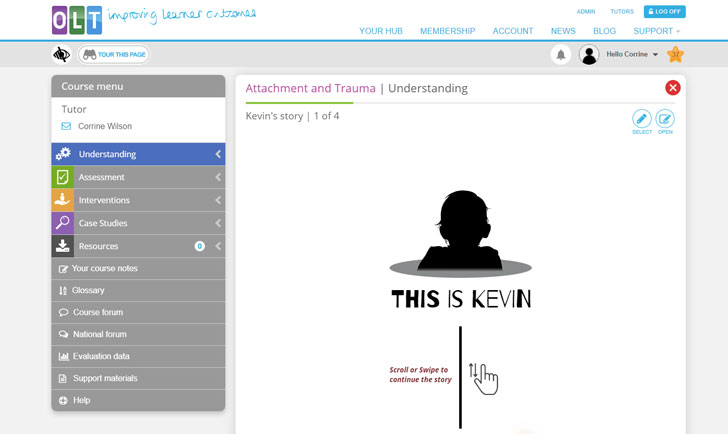
Screenshot from Understanding page 2 - Child trauma
- What is attachment theory?
-
The origins of attachment theory
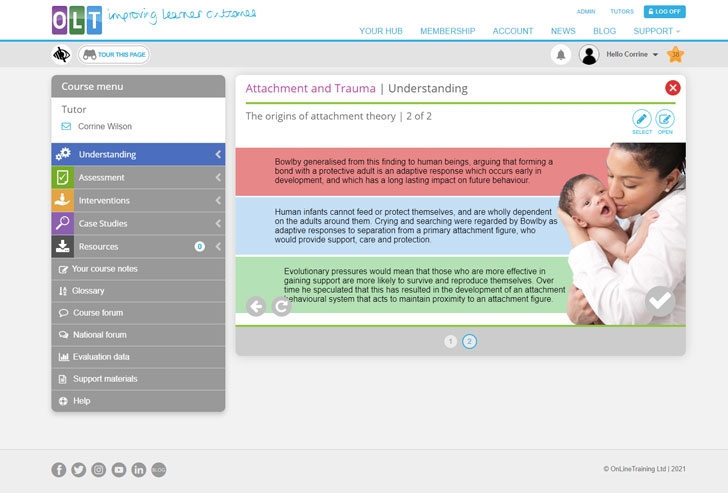
Screenshot from Understanding page 5 - The attachment behavioural system
- Impact on cognitive and emotional development
- The strange situation procedure (Mary Ainsworth)
- The 4 types of attachment
- The dimensions of attachment
- Why is attachment an important concept?
- Emotions and learning
- Criticisms of attachment theory
- What does the theory enable us to do?
- End of section quiz
- Section summary
Learn definitions of the different types of attachment disorder, and criteria for assessing behaviours and co-occurring difficulties, and the impact on learning.
- Section objectives and your learner profile
- Definitions
- Reactive Attachment Disorder (RAD)
- Disinhibited Attachment Disorder
-
Who is at risk?
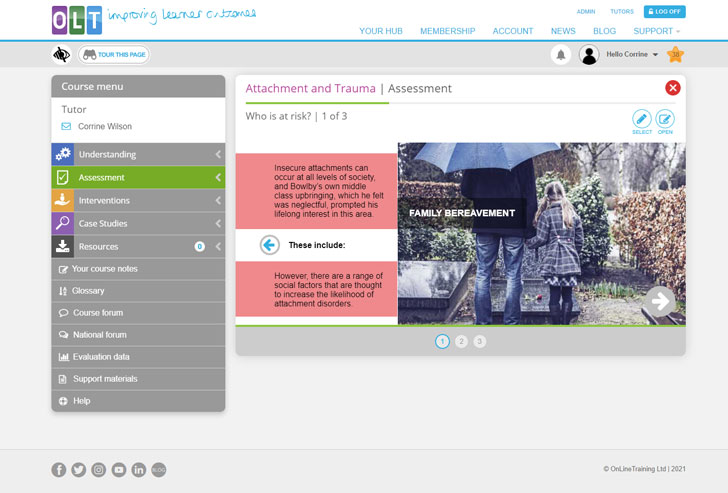
Screenshot from Assessment page 5 - Assessment tools
- Distinguishing RAD from other conditions
- Co-occurring difficulties: learning difficulties
-
Co-occurring difficulties: mental health issues
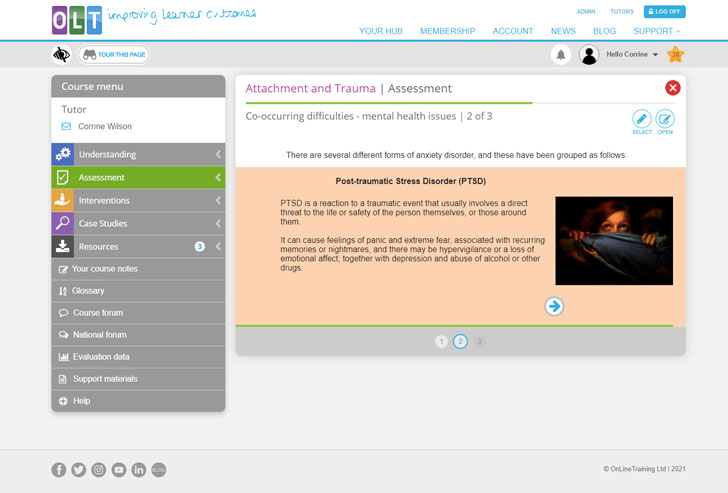
Screenshot from Assessment page 9 - End of section quiz
- Course assignment: Your Learner’s three SMART goals
- Section summary
Develop an awareness of your own reactions to challenging behaviour, how to respond to incidents, and the importance of a whole school approach.
- Section objectives
- Relating to those with attachment difficulties
-
Being aware of our own response
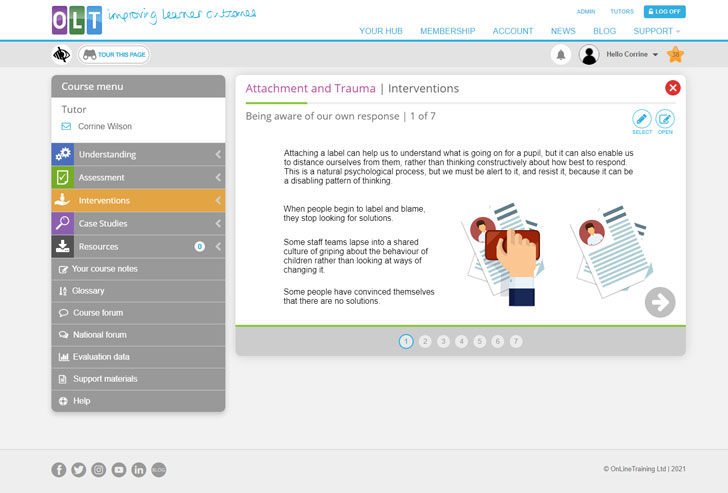
Screenshot from Interventions page 3 - The power of relationships
- The school as a secure base
- Building relationships
-
Creating a safe place
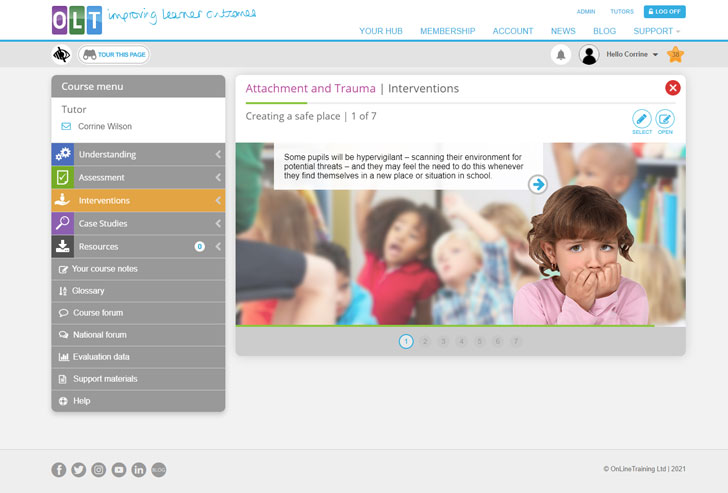
Screenshot from Interventions page 7 - In the classroom
- Personalising learning
- Whole school approaches - attachment aware schools
- Managing incidents
- Following an incident
- Supporting staff following an incident
- The team around the learner
- Concluding Kevin’s story
- End of section quiz
- Course assignment: Your learner’s interventions
- Section summary
View examples of individual experiences, and the assessments and interventions carried out to meet the needs, including attachment-focused therapy.
- Section objectives
- Case study: My exclusion story
- Case study: Jimmy and Adam
- Case study: Speech and Language assessment
- Case study: Attachment focused therapy
- Case study: Film ‘Removed’ (Part 1 and 2)
Better understanding of children in my class. Thank you
Teacher (07/07/2021)
This training has built upon and strengthened the knowledge I have already obtained over the years in my work place as a TA
Teaching Assistant (03/06/2021)
As a number of staff have completed the training it can be used as a discussion point when planning as a team to meet the needs of our pupils. This will ensure a broader impact across the school. Understanding attachment disorders makes you consider a more individual approach to supporting children - one size doesn't fit all!
Senior Leader (10/05/2021)
This has been difficult to assess as we have not been in school for any length of time due to COVID however when asked to assess a student with anxiety associated with attachment it helped me to review the student and suggest strategies that may help
Teaching Assistant (25/03/2021)
I have learned so much from this training. I feel confident in supporting and understanding the subject. We have a child in our class that is really benefiting from some of the strategies that have been implemented due to this training
Teaching Assistant (24/03/2021)
This training is exceptional and very well detailed and laid out. It goes through each stage with great presentations that keep the viewer wanting more. The tutor who helped me was always there to support me whenever I needed and always offering the best advice possible.
Other Position (22/03/2021)
I am currently working with two children who suffer with severe anxiety, this course has enabled me to build on existing skills and strategies I have in place. Improving my classroom/ teaching practice. A valuable course, thank you
Teaching Assistant (03/03/2021)
The training course has been a stimulus for conversations with the teacher I work with and I have thought carefully about each of our children. Setting the goals and interventions was interesting: two I would automatically do and the third is a direct consequence of the training.
Teaching Assistant (01/03/2021)
A child I am working with regarding attendance at school - this course has made me realise that the behaviours he shows all have meanings behind them. I will definitely change my approach with this child and apply some of the strategies I have gained on the course
Teaching Assistant (09/02/2021)
| Rating |
| |
Delivery
|
| |
20 hours, 1-2 hrs per week |
| |
Flexible start date |
| |
Assignment
|
Licences
Your school or education system can purchase a licence to deliver our courses.
Contact us to find out moreCertification
20 hrs CPD Certified What's this?
Certificate of Achievement

